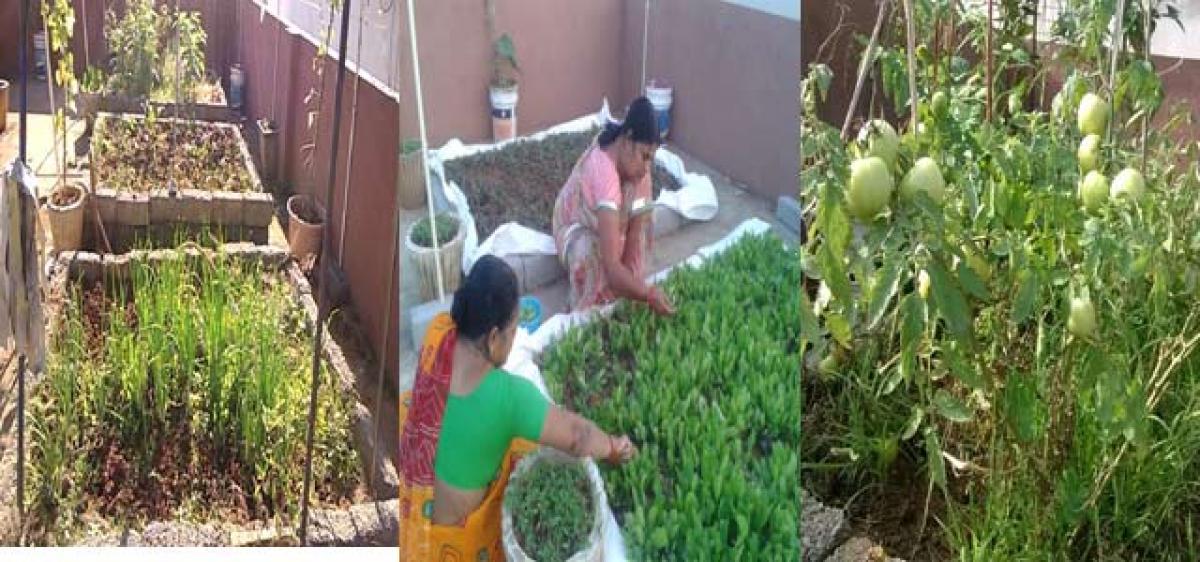Live
- State Cabinet expansion in focus as CM leaves for Delhi
- Need to reintroduce country’s forgotten pride: Bhagwat
- Pant shatters Iyer's IPL auction record, sold to Super Giants for Rs 27 cr
- Yuva Sangeetha Sammelanam held
- Dharani proves a bane for 25K families across State
- Reckless, Dangerous Arms Race
- Russia needs a peace deal as it is running out of soldiers
- MyVoice: Views of our readers 25th November 2024
- Lack of planning, weak narrative behind MVA debacle
- UTF dist unit golden jubilee celebrations begin
Just In

High cost of vegetables, and increasing use of pesticides and the not so welcome hybrid varieties of vegetables – No more. Say the new age city-based farmers, who within the limitations of space and facilities are dedicatedly developing organic gardens to meet their daily requirement of vegetables.
High cost of vegetables, and increasing use of pesticides and the not so welcome hybrid varieties of vegetables – No more.
Say the new age city-based farmers, who within the limitations of space and facilities are dedicatedly developing organic gardens to meet their daily requirement of vegetables.
CityTab met two such metro farmers, whose gardens are self sufficient. Shreenu Kumar, who was a farmer, before shifting to Hyderabad, one fine day, decided he wanted an organic kitchen.
He stays in an apartment in Alwal. He bought some land right in front of the apartment he stays and began his organic journey, “I started to grow vegetables mainly for two reasons.
Firstly, it is due to increased cost of vegetables and secondly because vegetables we get are usually of hybrid variety.”
He was fed up with eating pesticide ridden vegetables and looked for options to set up organic garden in his ground floor apartment.
He says, “It takes around Rs 4000- Rs 5000 to set up a vegetable garden in a small space. The plants that I grow include tomato, ladies finger, potato, sweet potato and onion.”
There are many organic farming enthusiasts out there creating their own little organic garden within the limitations of their home.
Kumar, who is one such enthusiast shares a few tips to grow organic plants at home, “Slightly dig the ground then sow a seed and ensure you water it every day without missing.
Dig it a little once in a week to see if there are any insects. Take sufficient measures to overcome pest problem by spraying soap flake powder, weekly on plants.
We should observe that the plants are not eaten up by animals or birds. A good garden is dependent on easy availability of water resources too.”
Kumar adds, “It is for personal use and not for business purpose. I do offer the vegetables to my relatives and friends. The rest provides for my family needs.”
Sudhir Mishra, Aeronautical engineer from Chintal, after retirement, decided to work with nature. “I was always interested in gardening since childhood.
I heard people complaining that they find it difficult to maintain a garden in flats. I started with creating gardening solutions for terraces. Interest in terrace gardens has increased in the last two years.”
Sudhir reveals that managing a garden involves hard work “A garden is a living organism and must be cared for. Watering the plants is vital.
If you own a garden, it’s always a good idea to get your hands dirty and work at making your garden more beautiful. I didn’t use plastic pots and I am against using chemicals.
I also used lot of recyclable materials to design one of the most important elements of work. I spent around Rs 15000 to setup a terrace garden and that included soil, organic fertiliser shelter around it and pipe line.
Firstly, I put plastic cover on the floor of the terrace, and then bordered it with 20 X 20 bricks. I filled the space with black soil, and then placed the plants that I required.
For each plot, I placed a small pipe line to drain the extra water. I grow tomato, radish, spinach, amaranthus, coriander, spring onion and gourd and brinjal.”
Sudhir explains, “Always check the mud by putting the finger in the dirt about an inch. You should water the plants when the soil is slightly dry. Pour little water so that it comes out of the hole in the bottom of the pot.
Avoid pouring a lot of water to the plant because pouring excess water can kill vegetable plants. Seeds need more water than plants.
When you sow a seed, keep it continuously moist until it sprouts several inches above the soil. Then spray soap flakes powder on the plants on weekly basis, and also add lot of fertilisers to it; it helps to grow your vegetables faster. The most important is sunlight, which is easy when the garden is on terrace.”
He adds, “I began by offering organic kitchen garden solutions to my friend. I helped him to open a vegetable and fruit farm in Dundigal.
He knows that I have lot of knowledge on cultivation, so he asked my help. I used to spend a lot of time at his farm. I also used to follow DD Kisan channel to learn about growing plants.
On the channel they telecast programmes that help us to Know in which season what should be cultivated”
He compares the difference between field garden and terrace garden, “Growing in a field is different from terrace garden.
On terrace we cannot have more soil, and so fertilisers are required. Small plants can grow only in limited quantity.”

© 2024 Hyderabad Media House Limited/The Hans India. All rights reserved. Powered by hocalwire.com







